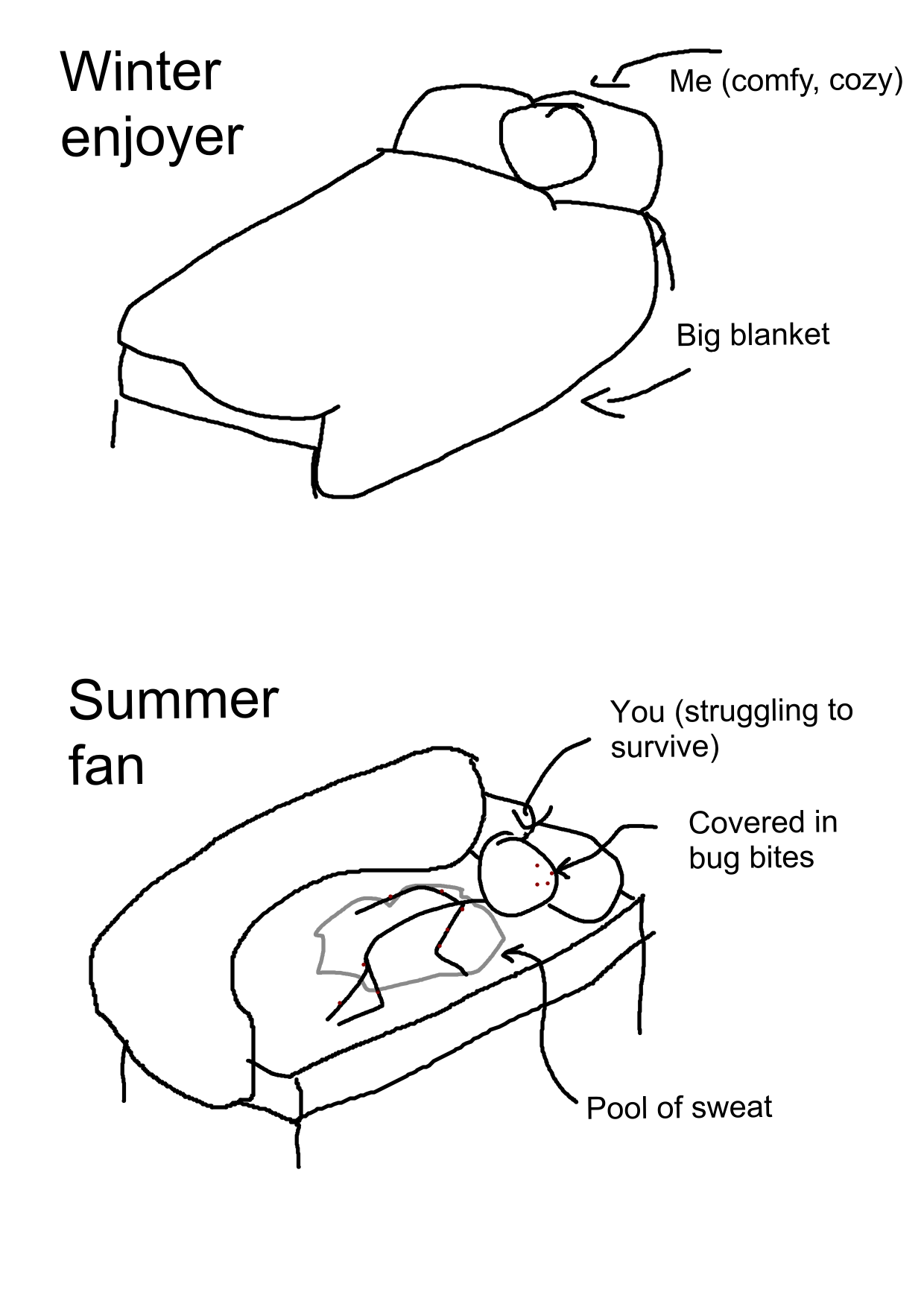this post was submitted on 29 Apr 2024
1016 points (100.0% liked)
196
16450 readers
2589 users here now
Be sure to follow the rule before you head out.
Rule: You must post before you leave.
founded 1 year ago
MODERATORS
you are viewing a single comment's thread
view the rest of the comments
view the rest of the comments

This. Fahrenheit is by far the better temperature scale for talking about environmental temps
Lol it's not, it's just what you are used to
0-100F is a base 10 scale that has inherent advantages. It's not just "what you're used to" any more than you get used to base 10 anything, including all of the metric system. (Which should be redesigned around base 12, but that's a whole different rant).
Beyond that, I find that 1 degree Celsius is too wide of a measurement for a lot of things, especially in the kitchen. My sous vide steaks get cooked at 130F, and that tends to be +/- 1F with the accuracy of the sous vide. If I said it's at 54C +/- 1C, that's not quite right. 54C is closer to 129F, so it's almost outside the accuracy range already. Plus, that 1C of accuracy covers 2.2F, so the finish temperature could be anywhere from 126.8F to 132.2F. Way outside the range, the steak does come out different at those temperatures, and the lower end of that is potentially unsafe (though that's a complicated topic, as well).
But then if I say 54.4C +/- 0.45C, now I have to use more numbers (since numbers with zeros at the end, as in the F example, are easier to remember) with more decimal places to get to the same thing. Dropping down to milligrade or whatever is now using a prefix that's uncommon with this unit of measurement.
But then, I also want to use grams to measure everything out in the kitchen. Ounces and cups are crude for no real advantage.
Metric's ability to convert between units easily isn't particularly useful in the kitchen. Unless you're doing some molecular gastronomy shit, that is.
Purity is not a virtue. Being able to use different measurement systems in different contexts is an advantage.
0-100F is not base 10 at all, it's just what you grew up with. I grew with Celsius and I can easily feel the difference in a few degrees. TV weather people saying that the temp will be in the 80s is less useful to me than if they tell me if it will be 27°C for example
Why would you do ±1°C if the sous vide can do decimals?
Also, the recipe calls for 130°F because it was made by an American, if you look for European recipes it will probably say 54°C. Neither will add decimals to their recipes because that's just being anal
I use F in the kitchen a lot because most of my appliances work in that and also because I basically learn to cook until I moved to the US, so again, what you are used to
Umm, yes, it is. Zero and a hundred, and convention is to break up temperatures like "it's in the forties". It's all base 10.
Is it going to be 27C all day long? Is it going to be between 80 and 90 all day long? One is more likely than the other, and even if it's 78 in the morning, that's fine, doesn't make much difference.
Here, C is overly precise for the task.
Because 130, a number with a zero at the end of it, is easier to deal with than 54.4.
This has an effect on UI, as well. Two buttons for going up or down. With F, you can do that in 1 or 0.5 degree increments. In C, it'd have to be 0.1, and you're pressing it more to get to where you want.
Which will be wrong. Steak turns out differently with slight changes in temperature around this level. European recipes will have to go to 54.4C.
No, it's using sous vide properly. Precision is why you do it.
Well this isn't really an accurate comparison. If they know an exact temperature, they would say it in both measurements. But they don't. So "in the 80s" is the perfect range. Preparing for 80 degrees is almost identical to how you would prepare for 89 degrees. There's no metric equivalent. The "20s" is way too big of a range. 20 vs 29 is a huge difference. Also, with it being base 10, you don't really need more information. 80 is 80% hot. Think of the hottest weather you've been in. 80 degrees is about 80% of that. And before you say "I've been in 115 degree weather". Yeah, so have I, I lived in arizona, and 115 is honestly not too much different than 100. After 100 it doesn't matter much. Same with below 0. But the 0-100 range, each degree matters quite a bit
If it had advantages over being what one was used to, it would be more popular. It's not, so it couldn't be.
F makes it easy to describe how people feel, C describes how water feels.
i like this